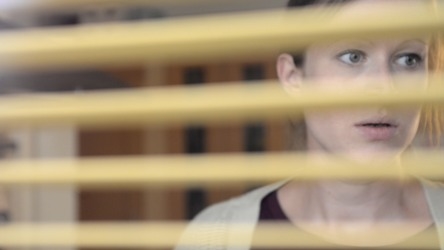Emma Bettridge Talks Ferment

© David Caudery
Emma Bettridge is the curator and producer of Ferment, the artistic development department of Bristol Old Vic. Two shows developed by Ferment play this week, The Window (22nd-25th October) and Echo Beach (24-25th October).
Tell us a little bit about Ferment?
Ferment started back in 2010 as a response to the artists in the region needing ongoing support to make the work they wanted to make. Bristol Old Vic, under Kate Yedigaroff and Sharon Clark, was already doing this – so it made sense to formalise this level of artist development so that we could lever funds to really make a difference to artists in the region. The aims and intentions that were put in place then remain the at the core of what we do today: That we maintain the flexibility to be responsive to the artists we are nurturing and use the resource we have to do the best thing for the work and not the other way around. Through this flexibility we galvanize this community of artists who are at once peers, provocateurs and trailblazers and whose work already feeds directly into the heart of the theatre.
How does Ferment work?
Ferment is simply the name for the work with do at Bristol Old Vic, in that we operate all year round to support and work with artists we are excited by. Ferment is curated; we invite artists to spend time working on an idea – this could be a week in one of our rehearsal rooms, a week on an artist retreat down in Somerset, a showing in our twice yearly fortnight of new ideas (January and July Ferment Fortnights) or commissioning support to make a show. So in terms of seasons, we have January and July to play with around 30-40 new ideas from artists we love, Ferment developed work punctuates our studios programme frequently – the work pushed through to production tends to have trialled an idea in one of our Fortnights this often leads to a year long development process in place to fully realise the final show. We go away on around four retreats a year, usually in weeks where we don't have productions, and almost every week in the year there will be something in a space at Bristol Old Vic being played with or developed. I think the strength of how we work comes down to the relationship we have with artists, myself and Sharon Clark (Literary Producer) spend a lot of time in the room with artists question and challenging decisions they make at an early stage, this makes the process more robust and creates a trust between us all which is invaluable by the time the show is into production.
Would you say the new writing scene in the South West is healthy right now?
Ferment doesn't work in a traditional sense with 'new writers' – so I may not be the best placed to answer this! I can say that I think writers are invaluable to any devised or collaborative work because they bring a different discipline. This of course works the other way around. All the work that Ferment produces is new, so I would say it feels like a great time to be in the South West. The artists who make work here are extremely talented and incredibly generous with each other which can only strengthen the output of the work (be it new writing or other).
What have been some of the success stories of Ferment?
My proudest moments are when I can genuinely be of use to an artist. I might ask the right question or I might give a piece of really useful advice. The success for me is that the artists who are making work in the region, are still making work here and we are still of use to them and in turn they are vital to the new wave of artists choosing to live and make work in the South West.
Tell us a little about the productions in the current season of work?'
The Window came out of a conversation between a writer and a performer, they wanted to make a piece of theatre to examine the notion of 'Big Society' and what the actuality of this might be. They wanted to create a solo performance which wasn't predictable, didn't use a huge twist (spoilers!) and which told a great story. The company have nailed this. I'm really excited about this piece. Charlotte Melia is an incredibly engaging performer, you're with her the minute she steps on stage. Silva Semerciyan is witty and shrewd and a cracking writer of characters and story. With direction from the brilliantly subtle Lee Lyford, a score by Tim X Atack and design by Rebecca Wood, this is a show with the Ferment ethos running right through the heart of it.
Echo Beach is a mesmerising show which starts with an examination of how people's dancing give away their character and walks us through some life changing moments in Hannah Sullivan's life. This show envelopes you. It is beautifully constructed and will leave you talking about how it made you feel long into the night. Again this piece is a great show to be a part of, Hannah has something very special in her performance style and I would urge everyone to go and see it. Not least for the opening dance moves.
Future plans?
I hope we can continue doing what we are already doing! The fact that with the incredible support of the Esmee Fairbairn Foundation we can provide stability and income to our artist community is hugely important. To give time and space to an idea so that it grows into a brilliant show, there is a continued need to be subsidised. This work is exciting and new and challenging, it is instrumental to the way the industry works, so we need to ensure this can continue for as long as possible.










